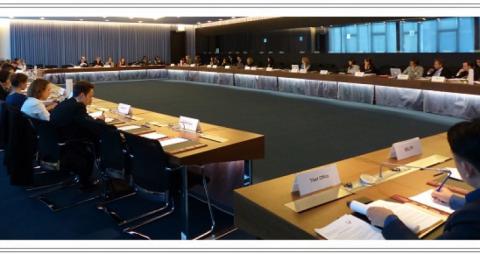
On 15 October 2015, Alkarama attended a pre-session briefing organised by the Delegation of the European Union to the United Nations, in view of the Mauritania's Universal Periodic Review (UPR), which will take place between 2 and 13 November 2015. Alkarama expressed its main concerns and recommendations, focusing on the practice of torture and the poor detention conditions, the authorities' failure to obtain transitional justice as well as their persecution of human rights defenders.
The fight against terrorism cannot justify the use of torture
Alkarama reminded the 23 European States present at the pre-session that torture and ill-treatment are still topical issues in Mauritania, where significant breaches of the Standard Minimum Rules for the Treatment of Prisoners have been identified. In fact, detention conditions remain deplorable; inmates continue to sleep in turns because of a lack of beds and they do not have access to health care and adequate food.
Moreover, even though Mauritania has implemented France's recommendation to ratify the Optional Protocol (OPCAT) of the Convention against Torture (UNCAT), the National Preventive Mechanisms (NPMs), created in 2012 by the Ministry of Justice under this Protocol, yet lack independence. It has indeed been entrusted in 2014 to Mauritania's National Institution for Human Rights (NHRIs), the National Human Rights Commission (CNDH), whose credibility has yet to be demonstrated, as highlighted by the Rapporteur on Mauritania to the Committee against Torture (CAT) on 13 May 2013, who said that "the composition of the State party's delegation shows that there is still confusion between the State's responsibilities regarding the protection against torture and those of other parties such as national human rights institutions."
Alkarama also deplored the persecution of human rights defenders and the violations of freedom of expression and freedom of association guaranteed by Article 19 of the International Covenant on Civil and Political Rights (ICCPR). An example is the anti-slavery activist Biram Dah Abeid, arrested 11 November 2014 during a peaceful demonstration aiming to raise awareness of the need to fight against this practice.
Transitional justice and duty of remembrance
During the pre-session briefing, Alkarama emphasised the numerous crimes committed against black Mauritanians between 1986 and 1991 − arrested and severely tortured, some of them executed in particularly cruel circumstances. Local civil society now estimates that 3,000 individuals were arrested and tortured during this period.
Today, the denunciation of these crimes and impunity of the perpetrators continue to be systematically suppressed by the authorities. Such was the case of Abderrahmane Ould Ahmed, who survived in 1991 his detention in the notorious Inal Garrison north of the country, arbitrarily arrested again on 25 June 2015. Alkarama called on the EU States to put pressure on the authorities in order to shed light on this most tragic period in Mauritania's history.
Alkarama's key recommendations:
During the briefing, Alkarama proposed key recommendations to the authorities, aiming to improve the human rights situation in the country:
- Develop a national protection mechanism (NPM) and make sure the national human rights institution, the CNDH, is in full compliance with the Paris Principles;
- Amend the Penal Code so that torture is recognised as a separate crime and delete any exceptional circumstances which might justify its use;
- Ensure that detention conditions are in compliance with standards set out in international law, including the Standard Minimum Rules for the Treatment of Prisoners;
- Ensure respect of the freedom of association, expression and peaceful assembly;
- Shed light on the violations committed between 1986 and 1991, prosecute the perpetrators of these violations and adequately compensate the victims or their dependants.
For more information or an interview, please contact the media team at media@alkarama.org (Dir: +41 22 734 1008).
